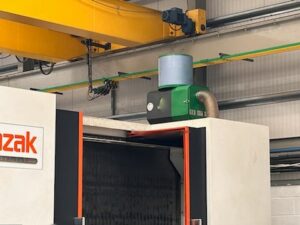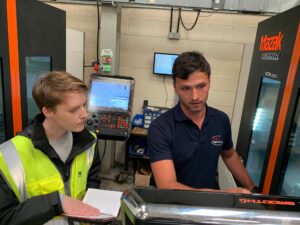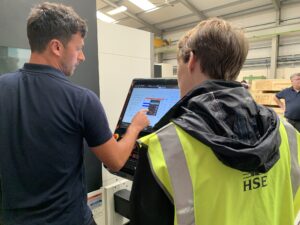- Regulator warns of risks and need for health checks
- HSE inspections to target use of specialist machines
- Director of inspected firm says “don’t feel intimidated”
Businesses are being warned to make sure their staff are safe when working with metalworking fluids or coolants.
It’s a highly technical, specialist field applying precision engineering – but can also cause harm to the lungs and skin.
Past inspections by the Health and Safety Executive (HSE) have uncovered poor performance around control of metalworking fluids in businesses that use computer numerical control (CNC) machines.

Exposure to metalworking fluids – also referred to as ‘white water’ – can cause harm to lungs and skin through inhalation or direct contact with unprotected skin; particularly the hands, forearms and face.
Breathing in the mist generated by machining can lead to lung diseases such as occupational asthma and occupational hypersensitivity pneumonitis.
Manufacturing businesses should implement control measures and carry out health surveillance checks with occupational health professionals.
More about the campaign, and tips on how to keep workers safe, can be found here.
Machinists and metalworking fluid – Work Right to keep Britain safe
HSE inspector Fiona McGarry, said: “Lung problems and irritated skin don’t have to be associated with working with metalworking fluid if you take the right precautions.
“It is really important that control measures and fluid quality checks are in place to keep workers healthy. Health checks are essential to identify signs of ill-health early.”
To support the campaign, HSE will carry out inspections to look at how employers are ensuring workers are protected from exposure to fluid or mist generated by CNC machines across Great Britain.
Britain’s workplace regulator plans to carry out unannounced inspections between now and March 2024.
One business to have received such a visit was Nottingham-based engineering firm CNTL Ltd, earlier this year. Dane Rawson, the firm’s director, was apprehensive at first but soon saw the inspector was there to help.

He said: “I’m new to this side of the business, I haven’t dealt with a health and safety inspection before. At first, I was cautious, but it didn’t take long for the inspector to make us feel comfortable. She wasn’t trying to catch us out.”
The inspection showed the company had safe working practices in some areas, but it was asked to install local exhaust ventilation (LEV) on its CNC machines.
Dane and the team have noticed the difference: “We have several high-tech machines that constantly use pressurised coolant – it’s bound to create a mist.
“It was something we were aware of and had explored the option of installing LEVs, however as a result of HSE’s visit we wanted to follow their advice and action this sooner.
“We’ve noticed now that the smell of coolant is no longer there and air quality is much improved. It’s definitely a cleaner and safer environment to work in. The staff feel like we’ve done the right thing for them and know their wellbeing is a priority of ours.”
To reduce exposure, you need control measures in place. Local exhaust ventilation (LEV) should be fitted on CNC machines to carry away any harmful metalworking fluid mist, which is difficult to see in normal lighting.

Fluid quality should be regularly checked focusing on concentration, pH, bacteria and contaminants. Fluid systems can become highly contaminated with harmful bacteria.
Where there is exposure to fluid or mist, it is a legal requirement to carry out health surveillance even when preventative controls are in place. You will need to involve an occupational health professional and workers should be encouraged to report any health symptoms that occur.
Regular fluid checks are a part of CNTL’s weekly routine. They outsource to a company that carries out weekly coolant and dipslide checks.
The HSE inspection has had a positive impact on Dane, making him more interested in creating an environment that protects his team’s health as well as safety. He recently attended a trade fair in Germany, partly to understand the approach on the continent.
Dane’s message to any company that will be inspected is simple: “Don’t feel intimidated. They are only there to benefit you, your company and your staff.”
Notes to Editors
- The Health and Safety Executive (HSE) is Britain’s national regulator for workplace health and safety. We prevent work-related death, injury and ill health through regulatory actions that range from influencing behaviours across whole industry sectors through to targeted interventions on individual businesses. These activities are supported by globally recognised scientific expertise.
- More about the campaign can be found at: Machinists and metalworking fluid – Work Right to keep Britain safe.